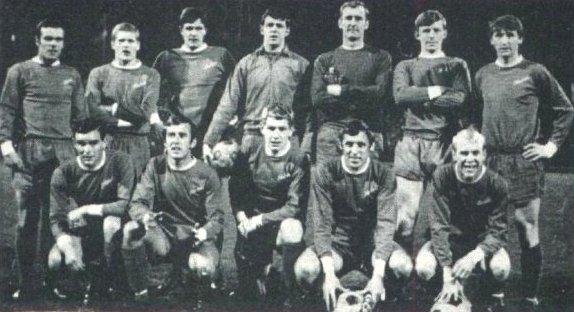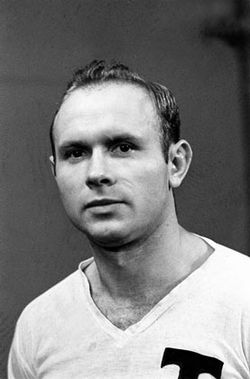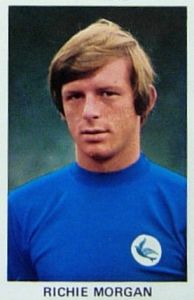
Pick the pretty Bavarian city of Augsburg, send club sides from Wales and Russia to play a football match there and ponder why 25,000 people turn out to see it. One of the great joys of European club competition in its early years was the random haphazardness of it all.
The curious geographical and logistical mix aside, how could you explain why this apparent mismatch was even taking place? One team was laden with international players and had been a recent champion of one of Europe’s major Leagues, the other was a modest outfit fighting to avoid relegation to the third tier of their domestic League. Welcome to the story of Cardiff City’s historic European Cup-Winners Cup campaign of 1967-68.

Entry to the competition itself for Cardiff had come through winning the national Cup of a country where they did not play their domestic football – another odd anachronism from the era. Kind draws carried them through the first couple of rounds against Shamrock Rovers and Dutch side NAC Breda, but Quarter Final opponents Torpedo Moscow were expected to be much too strong. Torpedo were certainly good enough to be described as a crack team – that qualitative adjective only ever used by journalists when writing about teams from eastern Europe back in the day.
It was beyond question that Torpedo did have an excellent team though and at its core was the extravagantly gifted Eduard Streltsov, perhaps the most naturally talented inside-forward Russia has ever produced. He was nicknamed ‘the Russian Pelé’ with good reason: his unorthodox game was a joyful explosion of dribbling, feints, flicks and backheels and was quite at odds with the typically functional and conservative Russian style. Streltsov was a figure at odds with the establishment off the field too. A controversial and possibly politically motivated rape conviction had seen him lose 7 years of his football career in a labour camp. His return in 1965 had confounded many, he picked up as if he had never been away and his form inspired Torpedo to the Soviet title. At the time of the Cardiff tie he was the reigning Soviet Player of the Year.
Another former Player of the Year award winner in the Torpedo ranks was Valery Voronin, a fine deep-lying midfield playmaker who had been a mainstay of the national side since the start of the decade. The keeper Anzor Kavazashvili, Viktor Shustikov in defence and strikers Vladimir Shcherbakov and Mikhail Gershkovich were all full internationals too. Cardiff did have a young John Toshack making waves up front, but this was a typically modest English Second Division team staffed with Welsh, Scottish and English journeymen.

A frenetic home match at Ninian Park in front of 30,000 saw Cardiff doggedly deny the Russians time on the ball. Chances were scarce, but the home side did gain a narrow advantage with a goal by winger Barrie Jones just before half-time. Torpedo dominated the return leg played for reasons of climate in distant Uzbekistan, though spirited defending once again by Cardiff denied them more than the single goal that levelled the tie on aggregate. This was a time when play-offs were still used to decide deadlocked ties so UEFA decided that would take place in the West German city of Augsburg.
While a Scottish player at Cardiff would be considered home-based for domestic matches, in European competition he was deemed to be foreign and these rules on foreigner limits were a general hindrance to British teams. Cardiff were forced to play weakened sides in European fixtures to comply with UEFA rules, a tough ask when their full strength team was no great shakes anyway. Two of their five enforced changes came because of injuries and the loss in particular of their experienced Scottish central defender Don Murray with strained ligaments was a major blow. His replacement would be a 21-year-old making his first team debut: Richie Morgan would go on to become a Cardiff legend, but the prospect of him starting a game of this magnitude was a daunting one.

Oddly, all three goals over the three matches were scored exactly two minutes before half-time with Cardiff duly taking a 43rd minute lead in the deciding game. Possession had been given up cheaply by the Russians and striker Norman Dean ran through to calmly score his first goal of the season. The Soviet League season was just getting underway, but Torpedo’s lack of competitive football was little excuse for their poor performance. Manager Valentin Ivanov gambled in bringing back Voronin into the team after he had served a lengthy suspension for drunkenness. It was a move that failed miserably.
Equally disappointing was Streltsov who was coming off a poor second best in his duel with young Richie Morgan. The Russian forward looked unfit and his control and shooting were horribly erratic as he was unsettled by the physicality of his opponents. His frustration boiled over just after half-time when Morgan fouled him, not for the first time, and unseen by the referee, Streltsov retaliated by kicking the defender around the throat as the pair lay on the ground. It seemed his brave debut was set to be ended prematurely, yet he was so determined to see out the game that, despite coughing up blood, he waved away the hovering stretcher bearers.

Ironically, his unwillingness to go off for treatment caused a row with referee Helmut Fritz who assumed he had feigned injury. To be fair to the German, Morgan’s throat did appear to make a miraculous recovery as he heartily bellowed abuse at the official while receiving a lecture about his conduct. The absent Don Murray was watching from the stands and was full of praise for his young replacement: “I’ve got to admit he played superbly. He took everything that Streltsov threw at him and never gave an inch.”
Reserve keeper Bob Wilson had been drafted in for the match more out of necessity than choice, but he too rose to the occasion and was Cardiff’s other hero of the hour. As Torpedo chased an equaliser, Wilson made a number of fine saves to deny them. He was helped out in part by the general ineptness of the Russian finishing though – in one attack he sprinted out of his goal to tackle Streltsov, the ball broke to Stenischev and the forward hopelessly miscued a simple lob into an unguarded net. In the very last minute Stenischev hit a better shot through a crowd of bodies from the edge of the box, yet Wilson somehow palmed it away for a corner to preserve Cardiff’s lead. Torpedo coach Ivanov commented afterwards that if Wilson was just a Cardiff reserve then Wales must have a goalkeeper under every tree.

This was Cardiff’s greatest European hour. They went on to run Hamburg very close in the next round as they became the first of only two lower division clubs ever to reach the semi-finals of a European competition. In 1971 they would memorably defeat Real Madrid at Ninian Park too, yet these were ties that were still lost on aggregate despite their best efforts. Torpedo Moscow was a very significant opponent that Cardiff had actually eliminated.
It would have been easy to get carried away with their achievement but Cardiff’s Scottish manager Jimmy Scoular was quick to establish the club’s priorities. While thrilled at the result, Scoular emphasised that the focus for everyone was winning the domestic battle against relegation. European football could be a mixed bag for clubs back then and was not especially lucrative – Cardiff budgeted on making only around £5,000 profit from their entire run in the tournament and actually lost money on the Quarter-Final games against Torpedo because of the particularly onerous travel costs.
The fatigue that came from playing European games themselves and the lengthy travelling that went with them was another factor that disadvantaged Cardiff and was one their domestic opponents did not have to contend with. Thoughts turned quickly to the following weekend, European stand-in heroes like Wilson were dropped and a full- strength Cardiff travelled to Blackpool and lost 3-1. Relegation was ultimately avoided though.
Context is everything. A lack of great financial incentive and the disruption to domestic routine diminished the impact of Cardiff’s great European adventure at the time, but generations later it is the Torpedo matches that memories still turn to. It is nights like those that transform an ordinary club into a storied club, something that a hundred successful battles against relegation can never do.



Fascinating stuff. I searched YouTube but couldn’t find footage of any of the Torpedo games though there are highlights of the Real Madrid match at Ninian Park.
I’m assuming the away leg was played in Uzbekistan because of the weather?
Couldn’t agree more with your concluding sentence.
The game was played in Tashkent and, you’re right, it was to do with the weather in Moscow.
Neil
Thanks for the memories, they all came flooding back. My abiding memory was of their goalkeeper, who I thought was better than Gordon Banks.
Neil
I thought the Scottish player classing as a foreign player rule only came into place in the 90s
Back then there was a 3 foreigners plus 2 assimilated foreigners rule – the latter based upon residency in a country.